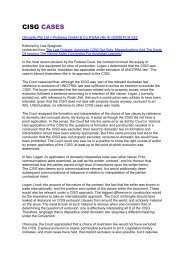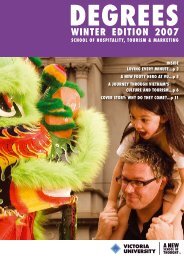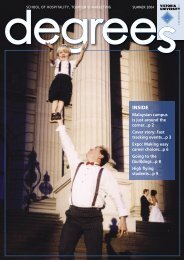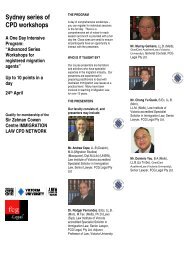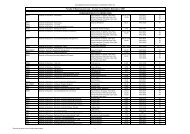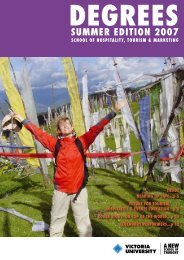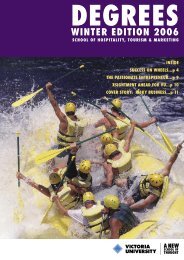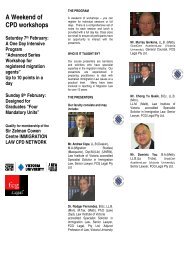A Glimpse Through the Kaleidoscope - Faculty of Business and Law ...
A Glimpse Through the Kaleidoscope - Faculty of Business and Law ...
A Glimpse Through the Kaleidoscope - Faculty of Business and Law ...
Create successful ePaper yourself
Turn your PDF publications into a flip-book with our unique Google optimized e-Paper software.
LISA SPAGNOLO<br />
Obviously, <strong>the</strong> less exposure a lawyer has had to <strong>the</strong> CISG at law school, <strong>the</strong> more<br />
inclined <strong>the</strong> lawyer will be toward exclusion in practice. 30 A widespread exclusion<br />
practice might encourage <strong>the</strong> jurisdiction‟s law schools not to cover <strong>the</strong> CISG in<br />
depth, creating a vicious circle that fur<strong>the</strong>r entrenches high start up costs within that<br />
jurisdiction. Compulsory inclusion <strong>of</strong> CISG at law school forces investment in basic<br />
familiarity. None<strong>the</strong>less, <strong>the</strong>re is more to it than just legal education. 31<br />
2.2.2 DISPUTE WORK DIFFERENTIAL<br />
Exposure to <strong>the</strong> CISG via litigation or arbitration work forces practising lawyers to<br />
invest in „start up‟ costs whe<strong>the</strong>r <strong>the</strong>y like it or not. 32 It follows that in jurisdictions<br />
producing greater quantities <strong>of</strong> CISG dispute work, <strong>the</strong>re are bound to be more<br />
lawyers who have made <strong>the</strong> investment in familiarisation with <strong>the</strong> CISG. So which are<br />
<strong>the</strong> countries that have produced <strong>the</strong> most CISG cases Has that fed back into greater<br />
levels <strong>of</strong> familiarity with <strong>the</strong> CISG or affected opt-outs<br />
It is extremely hard to tell. Even determining CISG case numbers is far from an exact<br />
science. Our best guide is <strong>the</strong> Pace <strong>Law</strong> School website, but it does not provide us<br />
with a complete picture. For example, arbitration is vastly underreported o<strong>the</strong>r than in<br />
a few jurisdictions. 33 The website has only reported one AAA case, does not report<br />
Australian arbitration cases, nor does it contain many ICC cases. Admittedly, in some<br />
jurisdictions, internal reporting is limited <strong>and</strong> delayed. For example, many Chinese<br />
court cases are not reported at all, <strong>and</strong> only selected arbitral cases more than 3 years<br />
old are reported by CIETAC.<br />
Thanks to <strong>the</strong> efforts <strong>of</strong> Pace‟s network <strong>of</strong> volunteer translators <strong>and</strong> <strong>the</strong> willingness <strong>of</strong><br />
CIETAC to co-operate, <strong>the</strong> Pace website contains some 341 translated Chinese<br />
cases, 34 but <strong>the</strong>re are many more that are ei<strong>the</strong>r unreleased or un-translated. 35 The 21<br />
29<br />
30<br />
31<br />
32<br />
33<br />
34<br />
142<br />
fn 2, at pp. 364-67. Fitzgerald found that 76% surveyed covered CISG within basic contracts courses,<br />
but in 95% <strong>of</strong> cases it was only mentioned occasionally or in passing. He fur<strong>the</strong>r found 86% covered<br />
CISG in basic sales courses, in 46% <strong>of</strong> cases forming a substantial part <strong>of</strong> sales coursework: ibid,<br />
Questions 29, 30, 33 <strong>and</strong> 35.<br />
In Switzerl<strong>and</strong> <strong>the</strong> CISG is taught within <strong>the</strong> compulsory contract law course, but both emphasis <strong>and</strong><br />
examinability vary greatly: Widmer, C. <strong>and</strong> Hachem, P., “Switzerl<strong>and</strong>” supra fn 4, at pp. 284, 287-89<br />
<strong>and</strong> 292.<br />
Accord, e.g., Widmer, C. <strong>and</strong> Hachem, P., “Switzerl<strong>and</strong>” supra fn 4, at p. 288; Gordon, M. W., “Some<br />
Thoughts on <strong>the</strong> Receptiveness” supra fn 2, at p. 368.<br />
This is also known as a co-ordination problem in economics: see, e.g. Liebowitz, S. J., <strong>and</strong> Margolis, S.<br />
E., “Path Dependence, Lock-in <strong>and</strong> History” (1995) 11 Journal <strong>of</strong> <strong>Law</strong>, Economics <strong>and</strong> Organization<br />
205, at p. 213; Liebowitz S. J. <strong>and</strong> Margolis S. E., “The Fable <strong>of</strong> <strong>the</strong> Keys” (1990) 33 Journal <strong>of</strong> <strong>Law</strong><br />
<strong>and</strong> Economics 1, at pp. 1-2.<br />
Flechtner, H. M., “Changing <strong>the</strong> Opt-Out Tradition” supra fn 22.<br />
Russia, Serbia <strong>and</strong> China report many more arbitration cases than o<strong>the</strong>r jurisdictions. Confidentiality <strong>of</strong><br />
arbitral proceedings is <strong>of</strong>ten pr<strong>of</strong>fered in justification <strong>of</strong> <strong>the</strong> reluctance to report arbitration proceedings.<br />
It is true that de-identification requires (minimal) resources. However, <strong>the</strong> process can yield valuable<br />
guidance for future decision-making.<br />
Case numbers are reported in <strong>the</strong> summary at .<br />
(2009) 13 VJ 135 - 156



